Presidential scholar brings historical context to 2024 race

Professor Ellen Fitzpatrick shares the history of women's pursuit of the presidency in visit to campus.
Throughout the history of the United States, most people running for president have had common traits. Regardless of party affiliation, white men of means have traditionally found themselves at the top of the ticket. But as Ellen Fitzpatrick told Assembly Friday, the history of women running for the highest office in the land dates back much further than you might imagine.
“I’m going to begin today with the takeaway message,” Fitzpatrick said. “Historical change takes a very long time. Often to achieve especially transformative and profound change, it doesn’t come easily.”
Fitzpatrick spoke briefly about Hilary Clinton’s unsuccessful 2016 bid for president and acknowledged Vice President Kamala Harris’ current campaign, but chose to use the majority of her time on the Assembly stage to talk about some lesser-known political pioneers. She pointed out that over 200 women have run for president including the first, Victoria Woodhull in 1872, nearly a half century before women had the right to vote.
“She was among the most radical presidential candidates of any sex,” Fitzpatrick said. “She set up her own political party and her own newspaper to promote her candidacy … at 34 she was ineligible under the constitution to even hold the office that she sought.”
A veteran professor of Harvard University, M.I.T. and Wellesley College and Emerita at the University of New Hampshire, Fitzpatrick is the author of The Highest Glass Ceiling: Women’s Quest for the American Presidency, a 2016 “Editor’s Choice” by the New York Times. She continued the conversation with students during a lunch and learn session in the Elting Room where the topics ranged from the upcoming election in the United States to recent elections in Mexico and Europe that have seen women assume ruling positions.